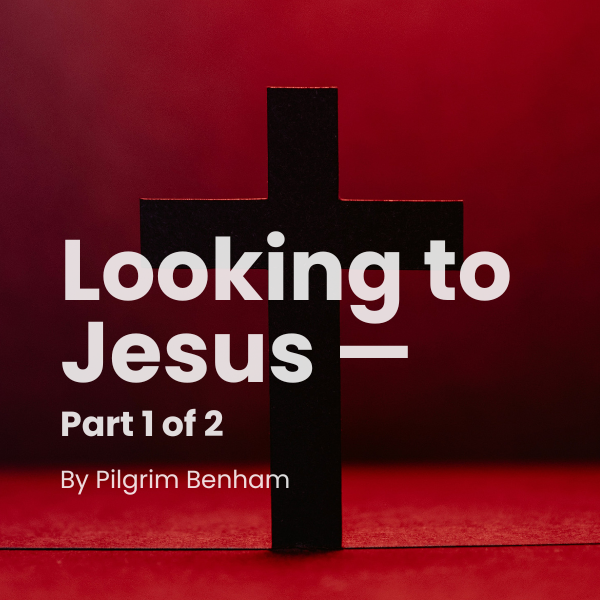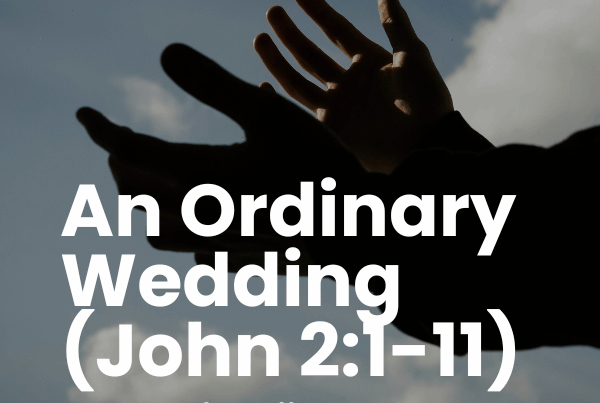
The Bible often likens our Christian life to running a race, and it’s a great metaphor for a few reasons. First, running, like the Christian life, is grueling! Running our race as Christians may be simple, but it’s not easy. The race metaphor is also helpful because it’s step by step. It’s moving somewhere. It’s progressive. Something’s wrong if our Christian life looks like running endlessly on a treadmill in some random garage, living the same year thirty times over and over.
Thankfully, we’re going somewhere! We’re being sanctified, we’re (hopefully) gaining ground, moving toward Christlikeness, becoming more like Jesus — and there’s a finish line! Also, Paul loved to use this race metaphor to remind us we’re not running someone else’s race. What a good reminder — I don’t need to be someone else — I can run my race. The race metaphor is so instructive for those starting their life pursuing Jesus and seeking to live wholeheartedly for him.
Which brings us to Hebrews chapter 12. The book of Hebrews addresses Jewish believers (hence the name, Hebrews) who were likely facing persecution and social pressure to abandon their faith in Jesus and return to the comfort of their traditional Jewish religious practices. In many ways, Hebrews reads like a sermon, which in my opinion was most likely an actual sermon preached by Paul and written down/recorded by Barnabas. (But if you disagree, I won’t die on that hill — please don’t @me!)
If Hebrews was a sermon, it would be a sermon all about the supremacy of Christ, how Jesus is greater, Jesus is better:
- He’s better than a written word of prophecy or the angels (ch 1).
- Jesus is better than man’s dominion over creation (ch. 2).
- Jesus is better than Moses or Joshua (ch. 3-4).
- Jesus is better than the high priests (ch. 5), the old covenant (ch.8), the tabernacle or sacrifices (ch. 9-10).
- He’s better than any of our heroes of the faith, because he’s the pioneer and perfecter of faith itself, bringing to completion what they all longed for and pointed toward (ch. 11).
Then we come to chapter 12 verse 1, which gives us a “therefore.” Therefore, in light of all of these truths, these proofs of how Jesus is superior to the promises and types of the Old Testament, the practical application is for us as believers to look to Jesus, to Christ alone. Look at verses 1-4:
1 Therefore, since we are surrounded by so great a cloud of witnesses, let us also lay aside every weight, and sin which clings so closely, and let us run with endurance the race that is set before us, 2 looking to Jesus, the founderand perfecter of our faith, who for the joy that was set before him endured the cross, despising the shame, and isseated at the right hand of the throne of God. 3 Consider him who endured from sinners such hostility against himself, so that you may not grow weary or fainthearted. 4 In your struggle against sin you have not yet resisted to the point of shedding your blood.
Notice that even though there’s a great cloud of witnesses cheering us on, we’re not looking at them. There may be a finish line, but we’re not looking at that. According to verse 2, where are we looking? To Jesus!
There are four reasons that the Hebrews (and all believers) should look to Jesus as we run our race of faith:
1. We look to Jesus because he’s the founder and perfecter of our faith.
The Greek word “founder” in verse 2 could very well be translated the trailblazer, the pioneer, or the forerunner. Jesus is the founder, but he’s also the perfecter. He not only inaugurated (past-tense), but he also will complete (future tense) our faith — not just in a universal sense (i.e., that our faith as Christians is in Jesus) but also in a personal sense. Philippians 1:6 says he who began a good work in us will complete it!
Think about those in the hall of faith, just one chapter prior. Abraham’s faith, filled with lapses of lying and Hagar, is now perfected. Samson’s faith, marred by sinfulness and selfishness and childish riddles and bad haircuts, is now perfected. David’s faith, strong in his youth but marred by scandal in his later years, is now perfected. Let’s not even get started with Jacob, Gideon, Solomon, or Jesus’ disciples!
We look not to ourselves to run this race but to the One who founded and will perfect it in us. So many Christians act like Jesus’ three final words from the cross were not “It Has Finished,” but instead, “It Has Started.” In other words, they live as though Jesus merely kicked off the Christian faith with his substitutionary death — but now the real work, the deepwork, the behind-the-scenes grit and grind are up to us!
Isn’t it an incredible encouragement that the One who has the power to rise again and promises to come again is the same One who promises to also be with us to the very end of the age? That same resurrected King Jesus is the One perfecting your faith.
Growing up, I was a tall kid, so my mom and dad felt that should translate to being good at basketball. Haha, the joke was on them — I was terrible! But as I stood in the driveway taking shot after shot, which (let’s be honest) was brick after brick, my mom would say those three annoying words no kid wants to hear: “Practice makes perfect!” Not in the Christian life!
Practice doesn’t make perfect — Jesus makes perfect! Your final glorification isn’t dependent upon you. Isn’t that wildly wonderful, good news? Jesus began it, and Jesus will complete it. So we look to Jesus because he’s both the origin as well as the outcome of our faith.
2. We look to Jesus because he endured the cross.
Did you notice a few variants of the word “endure” throughout verses 1-3? Look again:
1 Therefore, since we are surrounded by so great a cloud of witnesses, let us also lay aside every weight, and sin which clings so closely, and let us run with endurance the race that is set before us, 2 looking to Jesus, the founder and perfecter of our faith, who for the joy that was set before him endured the cross, despising the shame, and is seated at the right hand of the throne of God. 3 Consider him who endured from sinners such hostility against himself, so that you may not grow weary or fainthearted.
The root Greek word we translate here as “endured” or “endurance” is hupomone (ὑπομονή). It means “to remain under” — but not in the sense where the believer is just muscling through turmoil by lying down to be willingly trampled. No, hupomone is a patient endurance that meets adversity head-on and overcomes obstacles with hope and joy. It’s neither unprepared nor surprised by trials, but rather expects them. David Guzik says, “A runner must be stressed to gain endurance. Sailors must go to sea. Soldiers go to battle. For the Christian, tribulation is just part of our Christian life.”
What exactly did Jesus endure, compared to what we must endure? Let’s not forget, or only talk about this around Easter: Jesus endured the cross — a Roman crucifixion — which was so devastatingly brutal that the word excruciating was itself derived from the word crucify. What Jesus endured included the entire hour described in John’s Gospel as soon as Jesus left the upper room. In the garden, in agony, as Jesus prayed for the Father’s will to be done, his facial sweat glands began rupturing blood, a medical condition known as hematohidrosis which is caused by intense stress. Jesus endured the betraying kiss of a close friend who sold him out, then watched his dearest friends abandon him as he was arrested by the temple guard. Jesus then endured false accusations, beatings, having his beard plucked out, being struck in the face, being stripped naked, being subjected to 39 lashings by leather whips most likely embedded with bone and glass, causing his back, legs, stomach, upper chest, and face to become disfigured.
As he was mocked by Herod, and later by Roman executioners, Jesus was clothed in purple robes and then stripped of them again, after his blood would have congealed and stuck to the fabric. Jesus endured a crown of spiked thorns which would have been pummeled into the soft tissue of his skull, and Jesus then endured being nailed to the exposed cross timbers of a tree, where over the course of many hours he would have bled out and eventually asphyxiated. Jesus’ cause of death was a ruptured pericardium after six hours of enduring brutal torture and execution.
The philosopher Seneca asked, “Would any human being willingly choose to be fastened to that cursed tree, especially after the beating that left him deathly weak, deformed, swelling with vicious welts on shoulders and chest, and struggling to draw every last, agonizing breath? Anyone facing such a death would plead to die rather than mount the cross.”
As if all of that physical torture wasn’t enough, it was the fearsome wrath of God that Jesus faced spiritually, as it was poured out upon him to its very dregs. We know the hymn:
It was my sin that held him there / Until it was accomplished!
His dying breath has brought me life / I know that it isfinished!
This is what Jesus endured. This is what he ‘hupomone-d’, what he “remained under.” But notice verse 3 also says, Consider him who endured from sinners such hostility against himself so that you may not grow weary or fainthearted. So Jesus not only endured the cross, but he also endured such hostility from sinners. It wasn’t enough that Jesus went willingly to such a horrific death, but it was all for hostile sinners! He endured hostility from the religious leaders who were jealous and wanted him killed. He endured hostility from his own people, who wagged their heads at him as they passed by Golgotha. He endured hostility from the Romans, who mocked him as King, yet also witnessed his death as truly the Son of God. He endured hostility from a punk teenager named Pilgrim, who, in his stupidity, kept rejecting the God who graciously allowed him to be raised in a Christian home and was obstinate in his teenage rebellion.
That’s what Jesus endured. What are we to endure? Does anything compare with what Jesus endured? Forgive my indifference when our prayer requests are that we are getting impatient in traffic! Verse 1 tells us what we endure: the race set before us. We lay aside every weight and sin which clings so closely. We look to Jesus who endured so that we may not grow weary or fainthearted. The writer of Hebrews reminds us in verse 4 that it hasn’t gotten too extreme yet in our race: “In your struggle against sin, you have not yet resisted to the point of shedding your blood.” Is that true? You may have had to endure some insane tribulation (and I don’t in any way intend to make light of that), but you haven’t shed your blood yet, have you? Then keep running! Keep looking to Jesus! He’s the One who endured the cross. So we look to him, especially when we face hostility from sinners.







